PKU Legal Artificial Intelligence Frontier Forum 2023 and "PKU Meta Legal Intelligence System"
Date:2024-05-29
On the afternoon of November 18, 2023, a press conference was held at the lecture hall of Kaiyuan Building, jointly sponsored by Peking University Law School, Peking University Institute of Artificial Intelligence, and Wuhan Institute of Artificial Intelligence. Gu Tao, Deputy Secretary of the Party Committee and Secretary of the Discipline Inspection Commission of Peking University; Chen Qiwei, Deputy Director of the Information Center of the Supreme People's Court; Guo Wei, Director of the Beijing Arbitration Commission and the Beijing International Arbitration Center; Wang Haihong, Member of the CPC Team and Vice President of the Beijing Municipal No. 3 Intermediate People's Court; Yu Haitao, Deputy General Manager of PetroChina Capital Corporation; Wu Xihong, Secretary of the Party Committee of the School of Intelligence and the Institute of Artificial Intelligence at Peking University; Wu Zhiqiang, Executive Director of the Wuhan Institute of Artificial Intelligence; Guo Li, Dean and Secretary of the Party Committee of Peking University Law School; and other leaders and guests attended the meeting. About 80 people attended the meeting, including the research team of Peking University's Legal Artificial Intelligence Laboratory and industry representatives from legislative bodies, law enforcement and regulatory departments, judicial organs, leading enterprises, law firms, and experts and scholars from relevant research institutions, law schools, and various sister faculties. The forum was hosted by Lu Jiangnan, Deputy Secretary of the Party Committee of Peking University Law School.
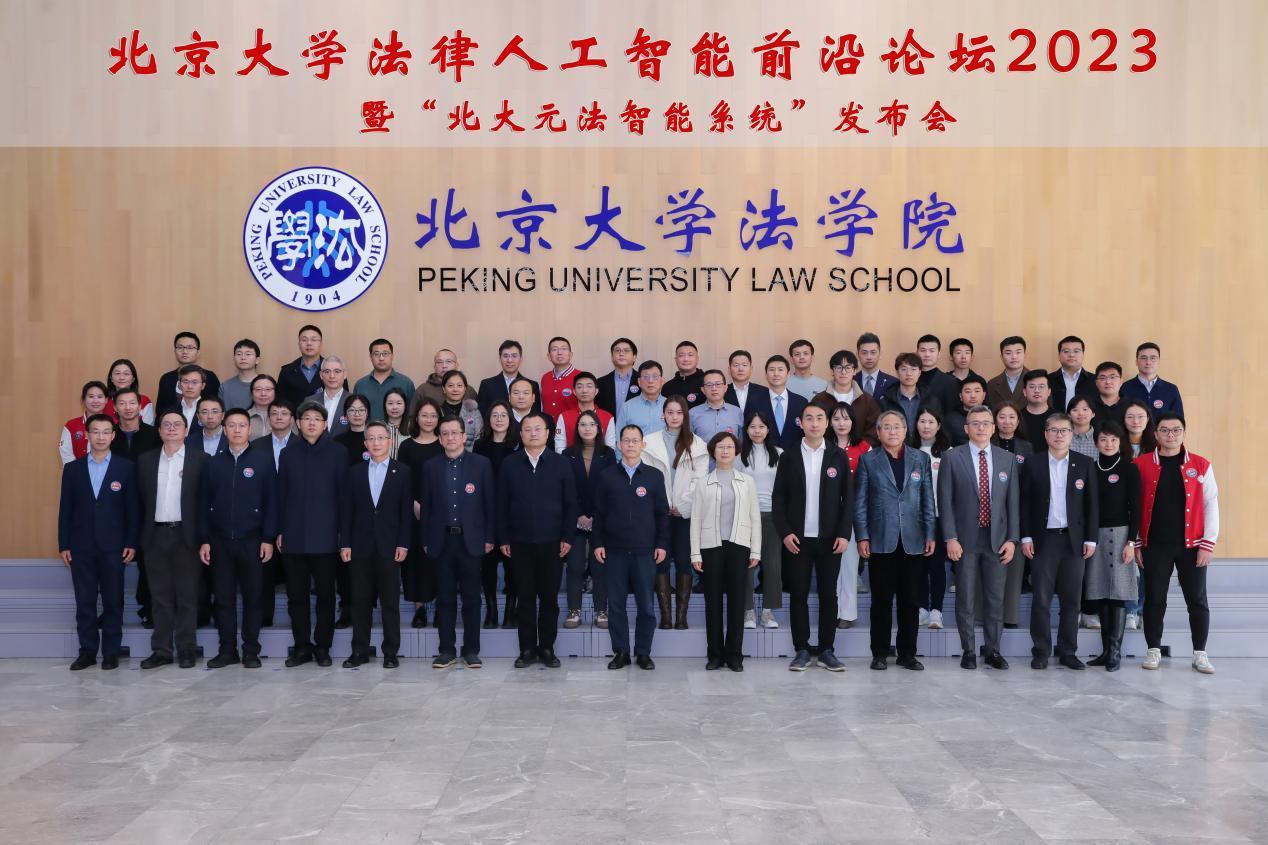
Gu Tao said in his speech that the combination of technology and legal rules in the age of intelligence has become an important area of artificial intelligence development and core competitiveness. Peking University has always prioritized the construction and development of interdisciplinary work, and the “Peking University Yuanfa Intelligent System” is a significant result of Peking University's interdisciplinary research. Peking University will continue to strengthen cross-disciplinary research on AI, law, and other humanities and social sciences, to further serve the overall goals of social progress and national development, and contribute new Peking University insights to global AI governance.
In his speech, Chen Qiwei, on behalf of the Information Center of the Supreme People's Court, warmly congratulated Peking University Law School, Peking University Institute of Artificial Intelligence, and Peking University Wuhan Institute of Artificial Intelligence. He emphasized that the Supreme People's Court has always placed great importance on the application of cutting-edge information technology and the construction of the Smart Court, which has created a new model of Internet justice with Chinese characteristics and world leadership. He expressed his pleasure in seeing that Peking University Law AI not only responded effectively to the challenges and opportunities of the intelligent era but also adhered to the mission of providing ubiquitous and precise legal services to the general public, successfully launching the groundbreaking Peking University Yuanfa Intelligence System. He believes that the launch of this system fully demonstrates the strong academic exploration and innovation capabilities of Peking University's Law and Artificial Intelligence disciplines in the frontier field of legal intelligence. He hoped that the system would have generalized service capabilities as soon as possible and provide service support and intellectual backing for judicial practice at an early date. He also looked forward to in-depth exchanges and cooperation with Peking University Law Artificial Intelligence Laboratory in the fields of intelligent justice and legal artificial intelligence, and to jointly exploring and promoting the modernization process of the intelligent court's service guarantee for trial work, contributing to the construction of the socialist rule of law system with Chinese characteristics.
On behalf of the Beijing Arbitration Commission and the Beijing International Arbitration Center, Guo Wei expressed his warm congratulations on the release of the “Peking University Yuanfa Intelligent System” as an important academic achievement of Peking University in the field of legal artificial intelligence. He pointed out that the application of legal artificial intelligence is the common mission of all legal professionals, and this conference is an important exploration of the new ecological model of the legal industry. The Beijing Arbitration Commission looks forward to further mutually beneficial cooperation and resource sharing with Peking University Law School to jointly promote the development of legal AI technology applications.
In his speech, Wang Haihong pointed out that the realization of legal AI requires full cooperation between the judicial sector and institutions of higher learning. Judicial intelligence is an important part of judicial modernization, and the court has a practical need to apply artificial intelligence technology to assist judicial trials. She said that the “NU Yuanfa Intelligent System” has specialization and strong capabilities in natural language processing, extraction of case facts, and provision of trial assistance services. With the cooperation between industry and research, and the further clarification of application scenarios, this system is bound to progress. She looked forward to the transformation of the system from laboratory results into practical application tools, effectively empowering the judicial trial business in reality.

Speeches by Gu Tao, Chen Qiwei, Guo Wei and Wang Haihong
On behalf of the School of Intelligence and the Institute of Artificial Intelligence of Peking University, Wu Xihong expressed his warm congratulations to the research team led by Yang Xiaolei from Peking University School of Law and the Laboratory of Artificial Intelligence in Law. He believes that the "Peking University Yuanfa Intelligent System" is an important achievement resulting from the cross-disciplinary and synergistic development between Peking University School of Law, the Institute of Artificial Intelligence, and the Peking University Wuhan Institute of Artificial Intelligence. He stated that the AI Research Institute advocates “heart” for machines and “reason” for humanities, empowering the development of AI with the ideas of humanities and social sciences, and empowering the research of humanities with mathematical and scientific models. He pointed out that the "Peking University Yuanfa Intelligent System" is a significant step towards general artificial intelligence and will make important contributions to the theory and practice of intelligent disciplines at Peking University.
In his speech, Wu Zhiqiang said that applying artificial intelligence to the field of law is a valuable, challenging, and innovative exploration. The goal of the "Peking University Yuanfa Intelligent System" is to significantly improve the efficiency of legal work and the level of legal governance, providing better legal services for all sectors of society. In the future, the Peking University Wuhan Institute of Artificial Intelligence will continue to deepen its cooperation with Peking University Law School and support the upgrading and iteration of the Peking University Yuanfa Intelligent System, which will help in constructing an intelligent society based on the rule of law.
In his speech, Guo Li expressed his gratitude to all parties for their long-term concern and support for the development of Peking University Law School. He said that the development of law and science and technology are closely related. Peking University Law School has long been committed to the intersection of law and science and technology research and has made a number of landmark contributions in exploring and developing China's legal digitization. The "Peking University Yuanfa Intelligent System" is an important achievement in this new stage of development along with the advent of the artificial intelligence era, and it represents an important attempt by Peking University Law School to apply legal artificial intelligence to social practice. Peking University Law School looks forward to cooperating with relevant departments of the legal profession, the science and technology sector, industry enterprises, service organizations, and other parties to jointly promote the development of legal artificial intelligence, so that the "Peking University Yuanfa Intelligent System" can grow with their attention and support.

Speeches by Wu Xihong, Wu Zhiqiang and Guo Li
During the release of the "Peking University Yuan Law Intelligence System," Yang Xiaolei, director and chief legal scientist of the Peking University Legal Artificial Intelligence Laboratory, Min Kerui, chief intelligent scientist, and Wang Yiwei, head of application scenarios, delivered keynote lectures. They discussed the value drivers and conceptual understanding, research logic and technological routes, application scenarios, and potential capabilities of the intelligent system's research and development.
Focusing on three dimensions of the intellectualization of law, Yang Xiaolei explained the background, concept, and value goals of the "Peking University Yuan Law Intelligence System" in the context of human society entering the intelligent era and the new form of social law. He discussed the relationship between the content construction, operation mode, and utility of law and information science, emphasizing that intelligence is the inevitable trend of legal development. He also pointed out that the key to realizing the intellectualization of law lies in the intelligentization of legal reasoning. As a general legal intelligence system, intelligent legal reasoning will promote the future development of general legal intelligence systems, with the "Peking University Yuan Law Intelligence System" being a foundational achievement in this research and development.
In his speech, Min Kerui explained that the AI law model possesses five key abilities: "understanding human language," "no illusion," "following rules," "explaining," and "reasoning." He noted that the PKU Meta Law Intelligence System has undergone pre-training on tens of billions of parameters and internalized tens of thousands of Chinese laws and regulations, achieving a very high level of accuracy in answering queries, thus fulfilling the abilities of "understanding human language" and "no illusion." The system overcomes the challenge of formal expression by using first-order logical expression and reasoning with symbolic algorithms, enabling it to "abide by rules," "explain," and "reason." He pointed out that the meta-legal system, based on a "rule-based reasoning engine + big model of law," serves as a foundational platform that can build legal intelligence systems for various application scenarios.
Wang Yiwei demonstrated and compared the actual use of the PKU Meta Legal Intelligence System with traditional legal consulting scene simulations on-site, fully showcasing the system's advantages such as "instant answers," "always available," "one-time setup," "all-in-one," and "meticulousness." He highlighted how the system's capabilities function in real work scenarios and specific tasks across legislation, judiciary, law enforcement, and compliance fields, illustrating the system's potential to unleash general legal intelligence across various domains.

Speeches by Yang Xiaolei, Min Kerui and Wang Yiwei
In the field experience link, the attendees fully tested the "Peking University meta-intelligence system." Experts and practical workers from different fields, based on their own actual needs, design problems to the intelligent system questions, consulting. The operation page of "PKU Meta Intelligent System" is simple and practical, which reduces the threshold requirements for users. In the legal question consultation, the intelligence system can not only deal with the simple single round of question and answer, also has the very good performance in many round of questions. While outputting the results of legal consultation, it also shows the ability to invoke norms, adjudication of similar cases and reasoning logic. Its excellent performance impressed the users, and the participants had a full exchange with the R&D team on the practical application scenarios and the accuracy of the results.
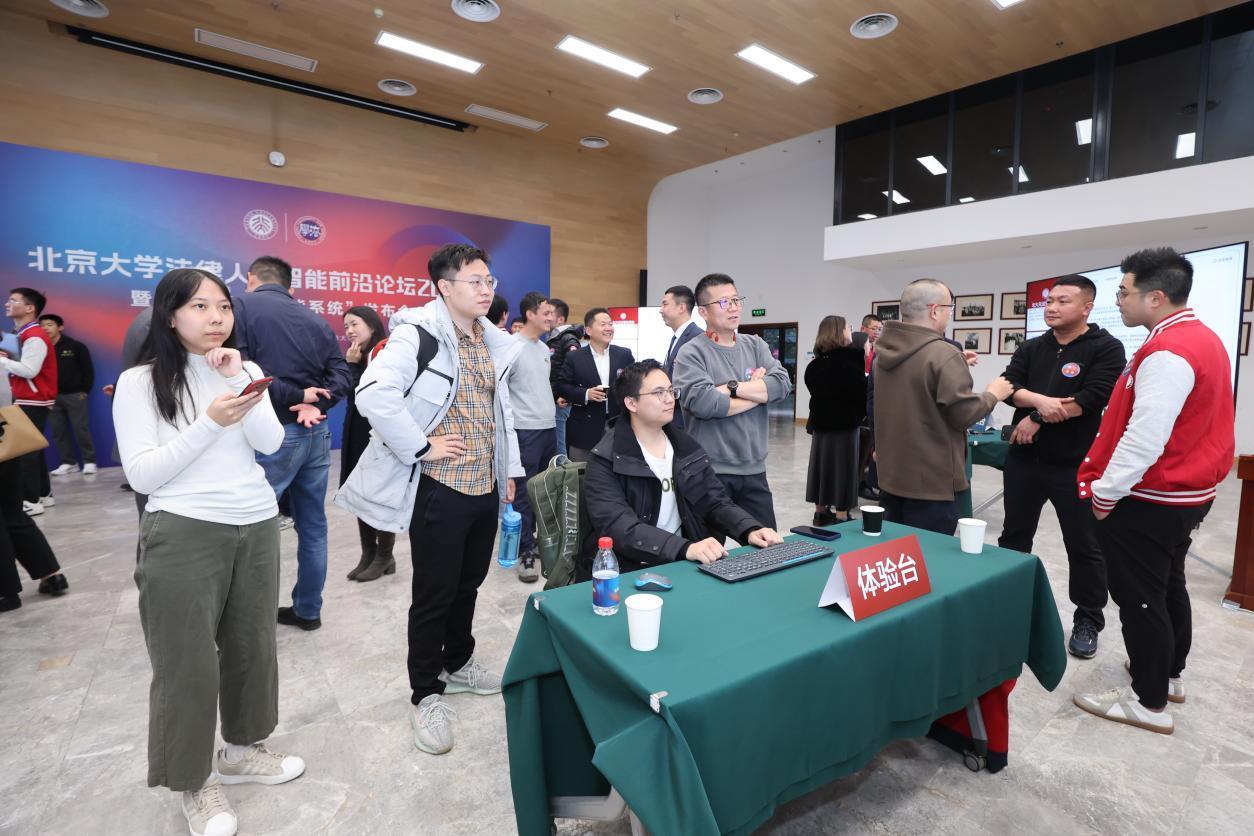
Participants try out the system and share their experiences
In the round-table forum, eleven participants shared their experiences of using the PKU Meta Law Intelligence System in two stages, and discussed the application value of PKU Meta Law Intelligence System and the prospect of legal artificial intelligence.
In the first phase of the roundtable forum, Gao Shaolin, former director of the Legal Working Committee of Tianjin Municipal People's Congress, Huang Haitao, director of the Trial Management Office of the Beijing No. 3 Intermediate People's Court and expert in trial business in Beijing, and Mou Chechang, partner of Beijing HaoTian Law Firm, together with relevant persons in charge of law enforcement and regulatory departments and compliance departments of central enterprises, respectively, evaluated the “Peking University Intelligent Law System” highly and put forward many valuable opinions and suggestions at the level of specific application value. They highly evaluated “NU-Yuanfa Intelligent System” and put forward a lot of valuable opinions and suggestions on the level of specific application value.
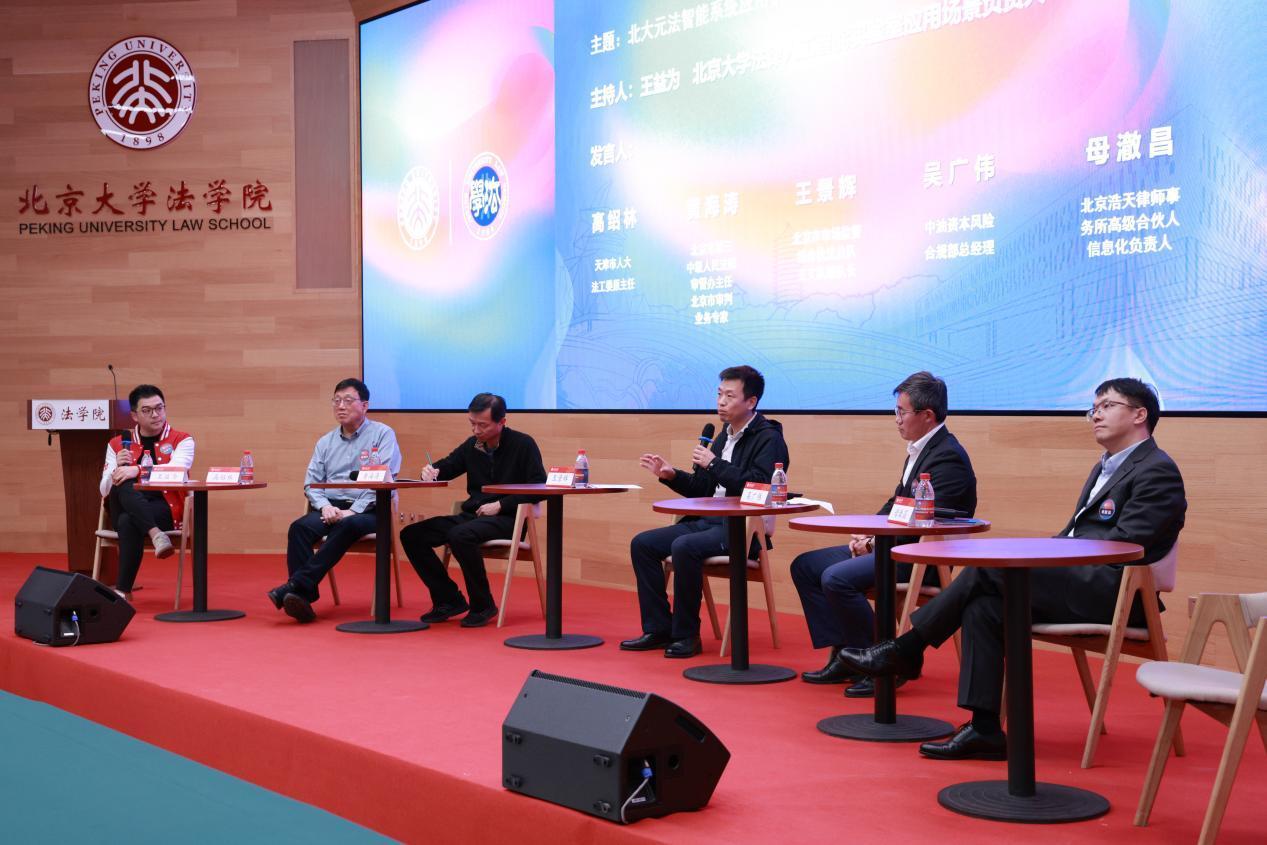
Stage I Roundtable Forum
In the second stage of the roundtable forum, Chen Wenkai, Director of Legal Affairs and Compliance Department of China Power Engineering Consultant Group, Zhang Jian, President of the Legal Affairs Department of Huawei Technologies, Xing Keke, Director of Beijing Yuanhe Law Firm, Zhao Xiaohai, General Manager of Peking University Yinghua Science and Technology Co,Yang Yaodong, Researcher, Institute of Artificial Intelligence, Peking University, Dai Xin, Associate Dean of Peking University Law School joined. Based on their respective experiences and thoughts, they discussed the huge development potential and broad application prospect of legal AI technology represented by “Peking University Yuanfa Intelligent System” in promoting industry model innovation, facilitating technological iterative progress, and assisting in the construction of a rule of law society, and so on.
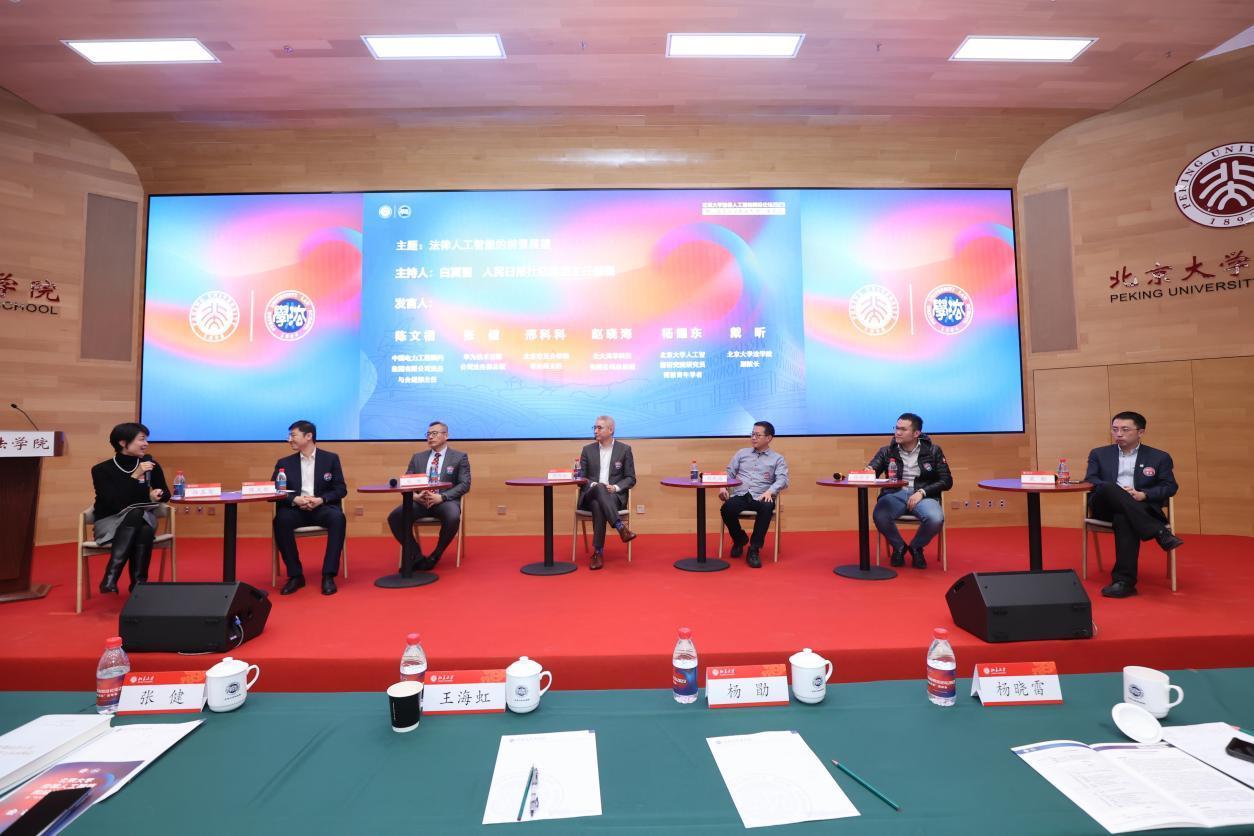
Stage II Roundtable Forum
Finally, Yang Xiaolei, Vice Secretary of the Party Committee of Peking University Law School, Vice Dean of the Institute of Artificial Intelligence of Peking University, Vice Dean of the Wuhan Institute of Artificial Intelligence of Peking University and Director of the Legal Artificial Intelligence Laboratory of Peking University, delivered a summary speech on behalf of the organizers. He expressed his thanks to all the leaders and guests who came to the forum for guidance. Legal artificial intelligence, he says, cannot replace people at the ontological level of value, but at the instrumental level, it can effectively empower people to work in the legal profession. Based on the Chinese legal system, PKU Meta Legal Intelligence System is an intelligent legal system constructed by the legal rules reasoning engine created by PKU Legal Artificial Intelligence Laboratory and the legal language model independently developed by PKU. In the future, the system will be committed to all areas of legal practice, and in the empowered social production and life experience growth.
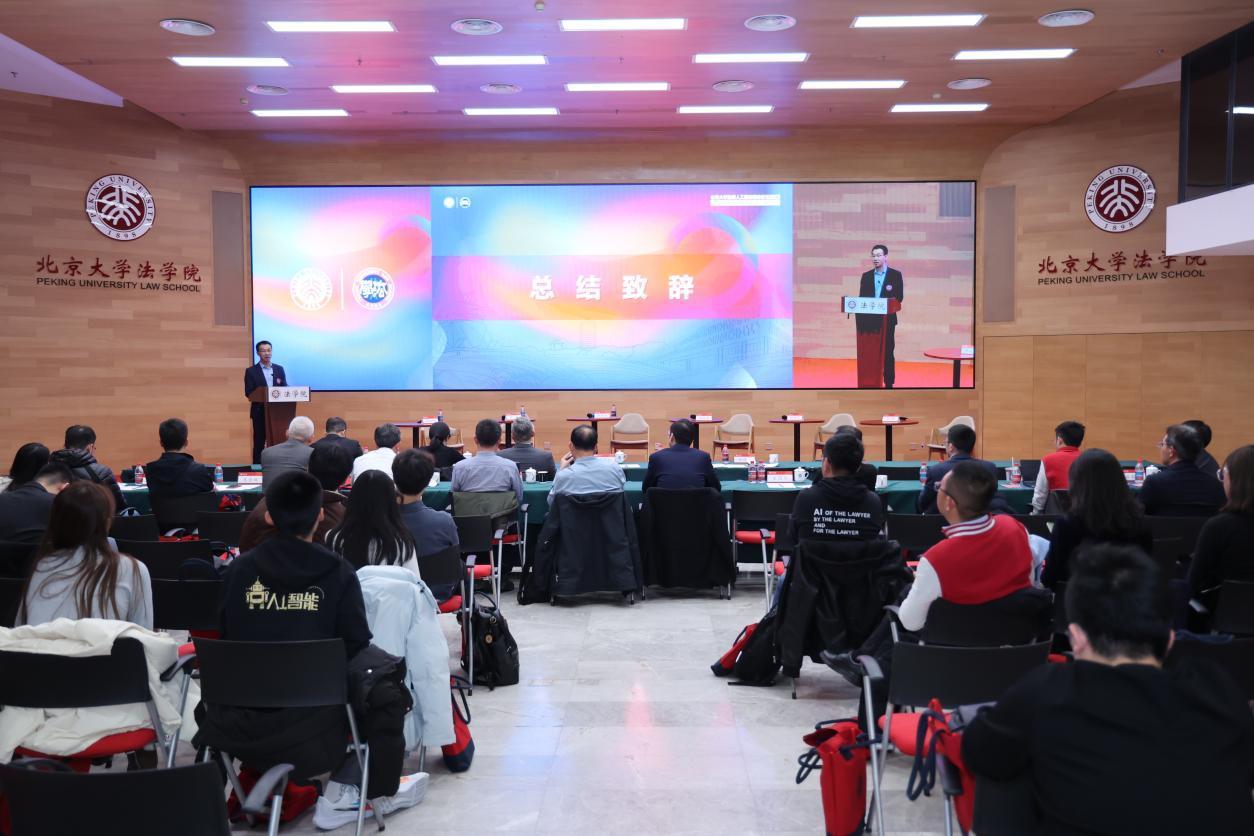
Summary Address by Yang Xiaolei
Taking the release of “Peking University Yuanfa Intelligent System” as an opportunity, this Legal Artificial Intelligence Frontier Forum invites industry leaders, experts, scholars and frontline practitioners to have dialogues and exchanges on the research and development of legal artificial intelligence. Representatives from the government, industry, academia, research and application fields generally believe that “Peking University Yuanfa Intelligent System” can not only be applied to public legal services, but also be widely used in legislation, law enforcement, justice, corporate legal affairs and other legal scenarios, so as to realize universal legal intelligence technology, build a universal legal intelligence system, promote the intelligentization of law and social governance, and realize an intelligent society. governance, and realize good law and good governance in an intelligent society.
This conference is not only a systematic review of the past six years' work of Peking University Legal Artificial Intelligence Laboratory, but also a new starting point for the future development of legal artificial intelligence. Peking University Legal Artificial Intelligence Laboratory will continue to plough into the synergistic academic resources of law and artificial intelligence, implement the overall strategic plan of the State, Beijing Municipality and Peking University, deepen the cross-study of “Artificial Intelligence + Law”, improve the theoretical research and practical application of general legal intelligence technology, empower the intelligentization of social governance, help build the rule of law in the era of intelligentization and make the construction of the rule of law in the process of Chinese modernization.
Translated by: Wei Mingxuan
Edited by: Shi Yucong



